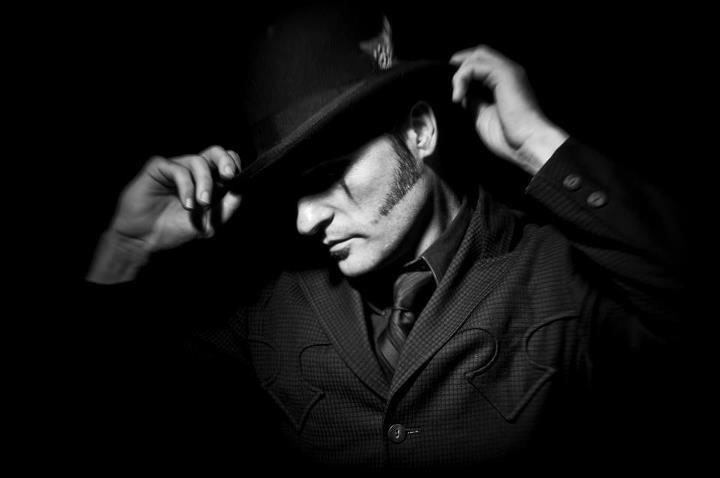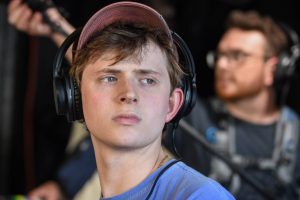The Last King of Vaudeville

By Andrew McClain
Editor-at-Large
Around noon on a Sunday, Idle Class editor Kody Ford and I pull up to Adam Putman’s Insomniac Studios in Fayetteville. The studio is seated comfortably in a small complex of industrial spaces, well-suited for a workshop or small warehouse. Shreve is waiting for us out on the loading dock, wearing his black bowler hat, white wife-beater, black jeans and black boots. Shreve welcomes us inside the studio, which is a large room with a vaulted ceiling, a partitioned-off control room, and a tiny, utilitarian corner bathroom. The rest is used to filled with every imaginable musical instrument, with an especially various collection of smaller keyboard instruments.
We sit down on a few old couches and begin to talk. Shreve talks candidly about his development as an artist, which starts at age nine on the drum set. He spent seven years of his youth touring with his older brother, Benjamin Del Shreve. He speaks of his first album, “The Cure For Yesterday,” and how drastically different it is from what he’s currently working on. In fact, it’s not uncommon for artists who have come this far from a debut album to disown their early work.
“I found my voice in with that album,” Shreve says, admitting that he was very attached to his influences at that point, learning to write by way of emulating them. As someone who was initially very shy about playing in front of others, Shreve admits to to “hiding behind his influences.” He said, “I was comforted to think that if someone didn’t like one of those songs, they just didn’t like Jeff Buckley, or whoever I was imitating. I was safe from being judged.”
After that album was released in 2006, Shreve decided to focus on disconnecting himself from his influences. “Letting my ideas breathe was a really vulnerable experience,” Shreve says. Finding his stage persona was difficult for Shreve. “I’d call my brother and say ‘Where do I look when I’m singing?’ It was uncomfortable not being behind a drum set. So I developed this persona as a protective measure.”
Shreve’s new persona introduced itself alongside a new sound — a fiery, burlesque rock. Shreve moved to New York City and recorded a new album called “The Entertainer” at Legacy Studios in Manhattan. His stage presence became bold and dramatic, and his lyrical subject matter shifted in a lurid direction.
“This persona ended up becoming indistinguishable from my identity and I really dropped my moral compass. Since then, it’s been a struggle to find a balance.” Shreve feels like he has found his balance, though, and seeks to leave his persona onstage. Shreve seems happy to be back in Northwest Arkansas, though adjusting to the pace of life was strange at first.
“I feel so much more productive because one day here seems like three days in New York.” Shreve is intensely business minded. Upon returning to Arkansas, he sat down with his keyboardist, Tim Grace, and drew up a very detailed business plan with a focus on promotion and hitting all of the major music venues within six hours driving distance of Fayetteville. Shreve quickly got to work on a new album, which he calls “The Jester.” Once again, he’s trying to significantly shift his style, this time by taking the ideas he developed on “The Entertainer” and making them more interesting.
“The Entertainer,” Shreve explains, “is kind of like a Hollywood vampire — slick, pretty, seductive and dangerous, whereas ‘The Jester’ would be like a more gruesome, gritty portrayal of a vampire. He’s ugly. He eats people.” Shreve paces while playing the new album for us over the studio monitors from his iPod. He wanders outside for a brief cigarette, which he says he has mostly quit in the interest of preserving his voice. He wanders back in. He picks up an antique accordion, which is over 100 years old.
“My friends in New York really pushed me to start listening to Tom Waits, but it took me a while,” Shreve says.
Suddenly, Shreve saw something in Tom Waits that he wanted to emulate. He wanted to take the slick, seductive elements of his music and have them trampled by the more terrifying, macabre elements.
“Everything’s more exaggerated and clashing with everything else. The rock is more rock. The vaudeville is more vaudeville. I feel like it’s dirtier and more organic.” Shreve is also coming into his own as a perfectionist, writing the album alone and recording rough demos of all the parts in the studio, then taking them to his band, The Sideshow to record for the album. Shreve speaks highly of his band’s musicianship.
“One one hand, it’s incredible to be able use them to get sounds out of my head that I’d never be able to play myself,” Shreve says, “but on the other hand, sometimes I wanted really messy keyboard parts, and I had some difficulty getting Tim to play his keyboard parts poorly enough. I’d say ‘You need to play this part like me. You need to play this like you don’t play piano so well.’”
Follow Sherve on Facebook, Twitter, or www.randallshreve.com.
(This story originally ran on The Idle Class Tumblr in February 2012.)



Comments